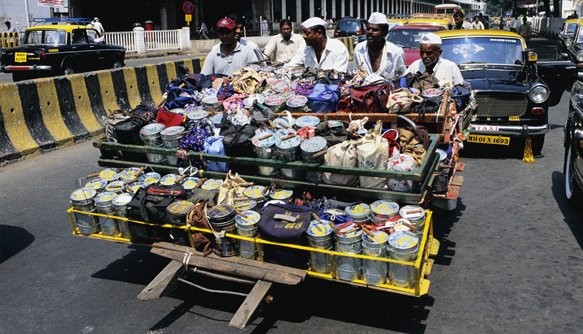
How Dabbawalas business has remained in the past 120years ?
Background
Dabbawalas are lunch box distributors in Mumbai, India, who carry and deliver freshly made home food in lunch boxes to office workers. In 1890 Bombay, Mahadeo Havaji Bachche started a lunch delivery service with about a hundred men. They transport packed lunch boxes from customer`s home and deliver it to their office and pick up the tiffin box (dabba) once they are through with their meal and return the empty box to their residence, for it to be ready for delivery the following day. Most people in Mumbai, prefer to eat homemade food as they have specific requirements related to religion, health and cost. Hence, a great number of housewife supply home-cooked lunch delivered through Dabbawala network system. The Dabbawala network has more than 5000 employees and earning a revenue of Rs.470 million a year.
3-I business model
Instant recognition
They use comprehensive and identification codes based on colors, characters and specific symbol on the lid. The use of those visual cue is able to create a simple comprehensive model which is easy to recognize. So, they are able to precisely deliver to their customer. The appearance of the Dabbawalas are also unique amongst the crowd which people can easily recognize. The Gandhi Cap is another symbol through which people can recognize them.
Instant configuration
Their delivery network system is highly organized. Based on CST station, they use bicycles and handcarts to travel short distances between the railway stations and homes/offices. Thus, avoiding traffic congestion, they can instantly deliver to customer.
Instant gratification
Providing steady, fast and accurate delivery service, they gratify with trust and value that results in offering more satisfaction to customer.
SWOT Analysis
Strength
- Team work, discipline and honesty
- Time management, ownership and commitment in work.
- High customer satisfaction, low operation cost.
Weakness
- Rely on Mumbai local service.
- Difficult to adopt technology due to uneducated employees.
- Difficult to expand new business due to uneducated employees.
Opportunity
- Tie up with caterers to serve various type of meals such as Chinese, Indonesian, etc.
- Expanding delivery network in other cities.
Threat
- Flexible time work system
- Women join workforce
- Increasing nuclear family structure
Making the Services tangible
- Reliability - With Sense of urgency and on-time-accurate delivery they create trust amongst consumers. This in turn makes them a reliable service.
- Assurance - Their rate of delivery error is one per million deliveries, representing 6 sigma that tells how their on-time delivery is accurate.
- Appearance-The white Mahatma Gandhi caps and uniform, distinctive bicycles and handcarts clearly represent who they are.
- Empathy - Under extreme rain, they are trying to deliver dabbas, reflecting their deep commitment and work ethics and also, they symbolized the resilience and spirit of Mumbai.
- Responsiveness – They are customer centric and know the importance of building and maintaining customer relationship. They are only focusing on delivering lunch boxes and do not engage in any other customer requests.
Conclusion
With sense of urgency, speedy, accuracy , on-time- delivery service, they create trustworthiness to their customers. Also, commitment in work, work ethnic and customer centric philosophy make the business be maintained for 120 years. For one more thing, their delivery network , distributing from CST, that Fedex and DHL have used logistic system, was already established systemically 100 years back. They said " We only consider how we can deliver lunch box to customer on time and they cannot be hungry".